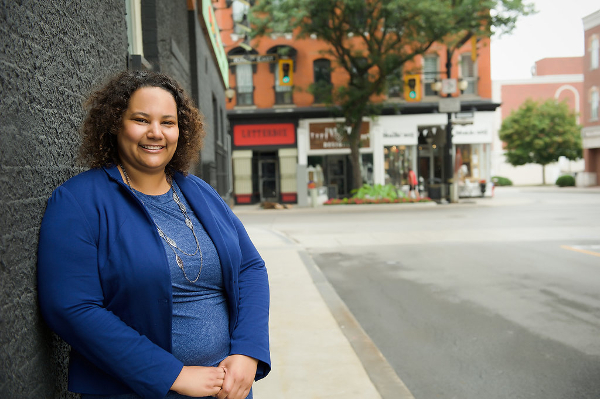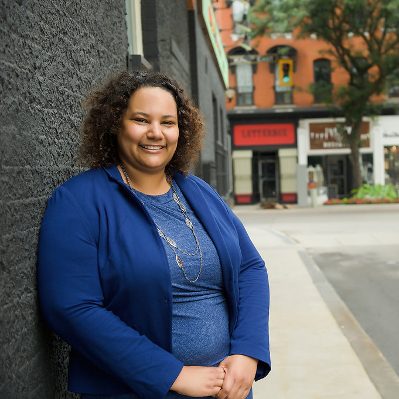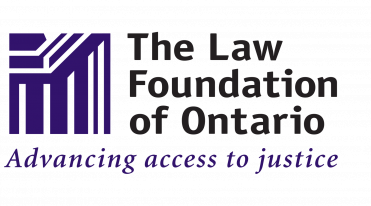
For many new Canadians, having affordable, stable housing is vital to their successful transition to Canada. Displacement due to gentrification can threaten that essential foundation.
“Some landlords don’t act in good faith. And, as many tenants simply don’t have the knowledge or tools to advocate for themselves, they often just leave when asked to and then find themselves priced out of the neighbourhood,” says Cassandra Roach, Project Coordinator of the [Dis]placement Project.
The [Dis]placement Project provided training on housing law to community leaders, emerging community leaders, and service providers who support new Canadians in the Riverdale and Beasley neighbourhoods of Hamilton. The project was an initiative of the Social Planning and Research Council of Hamilton, Hamilton Community Legal Clinic, and Core Collaborative Learning and was funded by The Law Foundation of Ontario, through its Connecting Communities granting program.
This partnership between legal and community organizations was designed to improve the capacity of frontline workers so they can provide basic legal information and referrals to their clients. These service providers work at organizations whose missions are not to provide legal advice or representation. And yet, their clients trust them and they are often the first, and sometimes only, people their clients approach with a legal problem. They become trusted intermediaries between their clients and the law.
“It strengthens our communities to have these trusted intermediaries,” says Marla Brown, a lawyer at Hamilton Community Legal Clinic, who co-facilitated the training sessions. “It builds trust to have someone people can go to for information and referrals. It truly becomes about increasing access to justice.”
The workshops were designed and delivered using adult education best practices, like interactive exercises and case scenarios. They covered information about the Residential Tenancies Act, such as low fault and no fault evictions, maintenance and repairs, and above guideline rent increases. They also included details about municipal bylaws and zoning and how to properly complete certain forms and documents. Marla says they covered everything from filling out a maintenance request and writing demand letters to landlords, to understanding how to spot errors in eviction notices. And, workshop participants learned when an issue should become a referral to the legal clinic.
Evaluations from the [Dis]placement Project found that the training had a direct and positive impact in helping people connect with the legal services they needed. So far, there has been a 30% increase of service providers directing new Canadians to the Hamilton Community Legal Clinic.
“There was a marked increase in the confidence of the people who attended knowing that they could now better support their clients affected by displacement,” says Cassandra.
One of the participants, Marla explained, was a Syrian refugee who had taken on a leadership role in his tenant association. “He became a safe space for people to go to. He’s trusted and people now felt comfortable going to him if they have concerns because they know he has knowledge he can share with them.”
Deanna Burns also attended the [Dis]placement Project training sessions. She supports families through housing issues as the Landlord-Tenant Navigator at Good Shepherd in Hamilton.
“Gaining first-hand knowledge and resources on how to connect our community to the resources they need was important,” says Deanna. “So often someone gets an eviction notice and they think that now they’re going to experience homelessness. But that’s not necessarily the case and it was really helpful for me to learn how they can preserve their tenancy.”
The tools and resources from the sessions have also been invaluable, she adds. “Now I have knowledge and tools that I can pass on to other people within my organization and within the community.”
That was the goal of training the trusted intermediaries, says Cassandra.
“In order to build the capacity of our community, we need to support each other. Training trusted intermediaries creates a ripple effect of good and accurate information going out into the community.”
The Law Foundation of Ontario has supported the unique and important role of trusted intermediaries for many years. Since 2015 alone, the Foundation has provided close to $15M in full and partial funding for the training and supports of trusted intermediaries so they can provide better legal information and referrals to those they serve.
The Foundation recently commissioned research to gain a deeper understanding of the role of trusted intermediaries. Learn more about and download Part 1 and Part 2 of the report: Trusted Help: the role of community workers as trusted intermediaries who help people with legal problems.
The Foundation also recently commissioned an evaluation of our Connecting Region program, which is an initiative of our larger Connecting Project. The evaluation focused on the effectiveness of the Connecting Ottawa project and seed funding that was granted to three consortiums to develop a regional model. Download a PDF of the evaluation report here: The Law Foundation of Ontario Connecting Region: Final Evaluation Report (2018).


